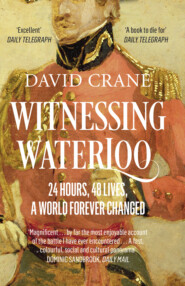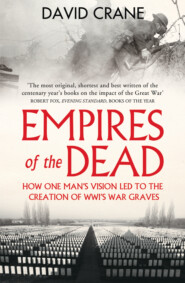По всем вопросам обращайтесь на: info@litportal.ru
(©) 2003-2024.
✖
Men of War: The Changing Face of Heroism in the 19th Century Navy
Настройки чтения
Размер шрифта
Высота строк
Поля
It was inevitably from western Europe, where there had been a rebirth of scholarly interest in Greek art, that this memory was given back to Greece and to the scattered communities of the Greek diaspora. Throughout the eighteenth century these colonies had flourished at ports and cities throughout the mercantile world, and as this renewed sense of identity became a fixed part of the émigré consciousness, the fashionable Hellenism of the dilettante was transformed into a heady cocktail of political theory, revolutionary fervour and Byzantine nostalgia.
For the nineteenth-century Greek, it was supremely Constantinople – the ‘polis’ – and not Athens that was the historical centre of the Greek world, and it was no coincidence that the movement for Greek freedom found its focus and leadership there. For the best part of four centuries the great Christian families of the Phanar
(#litres_trial_promo) had arrogated to themselves all the tasks that Muslim indolence or fastidiousness would allow them, and it was the wretchedly inept son of one of these princely families, the one-armed Alexander Ypsilanti, who in the spring of 1821 crossed the Pruth to spark off a Greek revolt that only the Turks themselves cannot have seen coming.
Ypsilanti’s campaign was a fiasco – by June it was over and he had shamefully fled to Austria – but as news of the uprising spread and the Greek flag was raised on Peloponnesian soil, fantasy had suddenly become fact. For centuries Greeks and Turks had been living within the empire side by side, and within weeks the Ottoman-Greek world was in flames, as community turned on community in a religious and racial war of a hatred and savagery that would have beggared the imagination of a Goya.
And as massacre followed massacre – Athens, Constantinople, Tripolis, Smyrna, Nicosia, Kos, Rhodes – it was inevitably the plight of the Greeks that excited the sympathy and indignation of the Christian West. In its earliest days European philhellenism was largely an academic pastime, but under the influence of Byron’s verse it became a popular cause that within months had inspired the first volunteers – Swedes, Danes, Bavarians, Saxons, Prussians, Italians, Russians, French, British and Americans – to raise, beg and borrow the money to make their way east to save the cradle of Western culture and political freedoms. ‘Fair Greece! Sad relic of departed worth!’ wrote Byron,
Immortal, though no more; though fallen, great!
Who now shall lead thy scatter’d children forth,
And long accustom’d bondage uncreate?
Not such thy sons who whilome did await,
The hopeless warriors of a willing doom,
In bleak Thermopylae’s sepulchral strait –
Oh! Who that gallant spirit shall resume,
Leap from Eurotas’ banks, and call thee from the tomb?
‘We are all Greeks now,’ Shelley proudly proclaimed from the cosy safety of Italy, but if this sounded good, what was actually meant by it would have been hard to define. Among the first volunteers who sailed out to fight were refugees from monarchical despotism who would have thrilled to the language of Shelley’s ‘Hellas’, yet side by side with them were academic dreamers and romantic fantasists, Byronic poseurs and aristocratic democrats, deluded Benthamites and disenchanted Bonapartists, charlatans and orthodox co-religionists, fortune-hunters, mercenaries and unemployed and unemployable military professionals, the flotsam and jetsam of a whole European generation who had known nothing but war. ‘What a queer set,’ the American doctor, Samuel Gridley Howe, one of the greatest of all philhellenes, wrote of these men – heirs at once in their mix of naïveté and depravity to the Children’s Crusade and the condottieri of fourteenth-century Europe. ‘What an assemblage of romantic, adventurous, restless, crack-brained young men from the four corners of the world. How much courage and talent is to be found among them, but how much more of pompous vanity, of weak intellect, of mean selfishness, of utter depravity … Little have Philhellenes done towards raising the reputation of Europeans here.’
The disappointment was not all one-way, because if these were seldom the kind of volunteers to inspire the Greeks with a keen sense of gratitude, the feeling of disillusionment on their arrival was invariably mutual. The one belief that sustained most philhellenes was the conviction that they were defending the heirs to ancient Greece, and when instead of Pericles and Epaminondas they found a nation of mountain bandit warriors as ready to behead, baptise or sodomise their Ottoman victims as the Turks were to enslave, circumcise and impale theirs, the revulsion was as intense and irrational as the enthusiasm it replaced.
In the whole history of the Greek War of Independence no more than a handful of foreigners ever bridged the cultural gap between the Greece of the imagination and the Greece of reality, and incomparably the greatest of these after Byron was Frank Abney Hastings. In many ways Hastings belonged to the mainstream of philhellene life, but even as a citizen with a grudge and a fighting man without a war there were crucial differences about him – differences of wealth, talent and temperament – that equipped him to survive a Homeric world of factionalism, greed, treachery and violence with a resilience that few other foreigners could match.
Glory, revenge and the joy of battle – the brazen tripod that holds up the Homeric world – these were the urges that drove Hastings, and the Greek War was as much made for him as he was for the Greeks. Like any good Whig aristocrat he was a firm believer in Greece’s ancient liberties, yet if he fed off her classical past it was not off the Greece of Demosthenes or Aristogeiton – ‘Harry Stodgiton’ as one enthusiastic Scottish MP called him – but off an older and more elemental code. ‘That Glory is in a great measure the object I propose to myself I cannot deny,’ he would tell Lord Byron, ‘& I must acknowledge that independent of the satisfaction I should receive from establishing a European reputation … ’twould be delicious revenge to prove to those who have deprived me of my rank in the British service that the object of their persecution is not altogether devoid of Naval merit.’
There seems no way of recovering the exact steps that led Hastings to Greece – he was in France, learning the language and ‘qualifying’ himself for the kind of foreign service Cochrane had made so glamorous in South America when war broke out – but the one certainty is that without the humiliation of the Kangaroo he would never have gone. ‘My lord,’ he had written pathetically to Lord Melville, ‘only those who like me have thirsted for glory, who like me have lived in the anticipation of fame can tell how intolerable it is to find the tender bud nipped when about to bloom.’
It is arguable that Hastings never recovered from the humiliation of the Port Royal inquiry, and he certainly emerged from it a different man, less anxious to please, less open to people and in some ways less likeable than the small lad who made friends so easily in Neptune. It is possible of course that this was no more than the natural consequence of age, but between the ‘gentlemanly’ and ‘exemplary’ young officer all his captains spoke of so warmly in their testimonials and the often harsh, judgemental, self-sufficient loner who we at last get to know in Greece it is hard not to detect the shadow of the Kangaroo.
For all his sense of rejection, however, Hastings’s dismissal from the service only confirmed and strengthened in him that blinkered obsession with his profession that had never left room in his life for much else. It is clear from the early diaries of Thomas Fremantle that the brothels of Naples were a staple part of a Mediterranean officer’s world, and yet apart from a single woman’s name scrawled in a pocket notebook – and she turns out to have been a boat moored in the Thames – there is not even a momentary hint among Hastings’s surviving papers that he was any more interested in Mediterranean women than he was in his father’s housemaids or those ‘pretty daughters’ of Halifax who ‘made such sad havoc with the hearts of both the army and navy’.
Hastings was capable of strong and loyal male friendship – Edward Scott in the Orlando, to whom he would leave his sword, George Finlay later in Greece – but there seems no reason to read any more into this than into anything else. It is always possible that letters will turn up to reveal a lover or a brace of children somewhere in France or the Morea, but until they do nothing is going to crack the adamantine image of a man who sublimated all his energies and ambitions – sexual, social, emotional, professional – into the all-consuming business of warfare.
It was not that there was ever anything cold about Hastings – the Greek marble bust of ‘ ’ gives very little away – on the contrary, he was a generous and highly-strung creature of endless moods, passions, angers, noble impulses and nervous energies. To the end of his life he would always crave recognition and fame, but as he sat in his metaphorical tent brooding or raging over real or imagined wrongs, his notion of achievement – like his idea of justice – went along with a profound sense of self that needed no grubby endorsement from the common run.
In this fierce and proud individualism, this refusal to sit at any bar but that of his own conscience, Hastings was supremely a child of his time – this is, after all, the age of Byron – and onto the natural hauteur of the eighteenth-century aristocrat was grafted the isolation of the romantic. ‘It was not out of consideration for others, but respect for himself, that he always bluntly told the truth,’ the philosopher-novelist William Godwin wrote of his fictional hero Borromeo – a portrait of another Byronic philhellene, Edward Trelawny, that in important respects is a far truer likeness of Hastings – ‘… Yet this man was eminently a moral being. He had certain rules of right to which he rigorously adhered, not for the sake of good to result to others, but, as certain theologians inculcate in their systems, from the simple love of justice, and without care for the consequences.’
It was, then, this Hastings – age twenty-seven, height five feet seven inches, eyes blue, hair and whiskers fair, forehead bold, nose ‘grand et aquilain’, as his French passport describes him – who in March 1822 boarded a Swedish merchant vessel at Marseilles bound for the eastern Mediterranean and Constantinople. From the earliest days of the revolt Marseilles had been a popular staging post for philhellenes, and travelling with him in the Trontheim was another volunteer, a coarse-grained but insinuating anglophobe American zealot blessed with just the right blend of physical toughness and moral laxity to equip him for the intrigues, warfare and vermin ahead, called George Jarvis.
From his father’s will it is clear that Hastings had volunteered without his blessing, but with the security of his mother’s marriage settlement – worth £5,000 – behind him and £300 in gold concealed round his person, he was in a strong position to travel on his own terms. In a typical piece of generosity he had paid for Jarvis’s passage to Greece, and on the evening of 3 April, after a journey of just over three weeks, the two men were landed with all their baggage on the barren northern tip of Hydra off the north-east coast of the Peloponnese.
The Greece and the revolution into which Hastings and Jarvis sailed in the spring of 1822 was in as precarious a state as it had been at any time since Ypsilanti had raised his standard. In the first months of the war the Ottoman government had been too busy with other problems to give the rebels its full attention, but with Athens and the historical fortresses of Nauplia, Patras, Rion, Modon and Coron – the ‘eyes of Venice’ – still in Muslim hands, and two Ottoman armies massing in the north-west and north-east to revenge the massacres of 1821, no newly arrived volunteer could be quite sure how or where he would find the Greece he had come to save.
And if the Turks were at last taking their war seriously, the Greeks were no nearer presenting a unified and coherent front than they had been in the first confused days of revolution. At the beginning of 1822 an Assembly at Epidaurus had drawn up a modern constitution for the country, but while the laws might have been framed in the image of Greece’s first president – the educated, frock-coated, bespectacled, Phanariot exile Alexander Mavrocordato – real power still lay with the island merchants, local primates, captains and klephtic chiefs whose loyalty to a central government or a united Greece was as notional as the constitution itself.
Hastings was not certain, until a group of islanders materialised out of the rocky landscape, whether Hydra was a part of the revolution, and even the offer of a boat and a guide to the town was not sufficient to still his suspicions. He had served long enough in these waters as a midshipman to be almost as wary of Greeks as of Turks, and when it transpired that there was room in the boat only for Jarvis and their baggage, he prepared himself for the worst. ‘I was amongst three,’ he wrote in his journal, ‘each had a knife – it is true I was armed “jusqu’au dent” but before I could have cocked a pistol, the man next me might have stabbed me & there appeared every probability I should pass the night in this bay – I therefore resolved to abandon my effects to their fate & go over land to the Town.’
This was easier said than done, but weighed down by his guns, sabre and gold, he hauled himself up the two hundred feet of almost sheer cliff and, ‘fatigued to death’, finally stumbled across a shepherd’s cot ‘and made signs for water’. For the first time since his landing he came across the other side of the Greek character, and strengthened by bread and cheese and the ‘real disinterested hospitality’ of the shepherd, made the last hour’s ‘painful march’ across country with life and money still mercifully intact.
When the sun rose the next morning, Hastings found himself in one of the handsomest and most prosperous towns in the whole of the Levant. The merchant families of the island had done well out of the economic blockades of the Napoleonic War, and the neat white houses and great Genoese and Venetian residences of Hydra’s ‘primates’ – great names of the revolution like Tombazis and Conduriottis – rose up from its secretive harbour in a natural amphitheatre that provided a gleaming contrast with the scenes of desolation only miles away on the coast of the Morea.
From the first months of the revolution the island had been one of the three centres of Greek naval power, but if Hastings imagined that his professional credentials or his knowledge would secure him a welcome, he was in for a rapid disillusionment. In the months he had spent in France he had been studying the latest developments in gunnery and ship design, and he arrived full of ideas and innovations, desperate to try out his new sights and paddle boats on an island community equally determined to resist the advice and habits of an English Messiah whose sole experience of command had ended in his dismissal for gross insubordination.
Perhaps only a young English aristocrat could have arrived with the confidence and assumptions that Hastings brought, but at the root of his dilemma was that same cultural gap that every philhellene faced. From the age of eleven he had known nothing but the disciplines and practices of the Royal Navy, and on Hydra he found a world in which war was a matter of profit and not honour, in which captains went to sea when and if they pleased, crews hired or withheld their services at their whim, and any notion of a ‘fleet’ – or cooperation between the islands – was more a voluntary and self-interested association of equals than a patriotic duty.
But even if this ‘bigoted’ Hydriot community was a world unto itself – impervious to anything Hastings had to offer, complacently sure of its own superiority, and independent of any central authority – it was still all there was, and at first light on 20 April Hastings and Jarvis sailed over to the desolate Corinth isthmus to present their credentials to Greece’s new president. On their first arrival they were received with a distinctly cautious civility by Mavrocordato, but it was only after further audiences with the Ministers of Marine and War had produced nothing that Hastings learned why. ‘Monsieur le Prince,’ he immediately wrote in protest – and one can hear a certain irony in the use of that title from a descendant of Edward III addressing the heir to a long line of Turkish ‘hired helps’ in the Danubian provinces –
I have determined to take the liberty of addressing your Highness in writing, as I found you occupied when I had the honour of presenting myself at your residence yesterday. I shall speak with freedom, convinced that your Highness will reply in the same manner.
I will not amuse you with recounting the sacrifices I have made to come to serve Greece. I came without being invited, and have no right to complain if my services are not accepted. In that case, I shall only regret that I cannot add my name to those of the liberators of Greece; I shall not cease to wish for the triumph of liberty and civilization over tyranny and barbarism. But I believe that I may say to your Highness without failing in respect, that I have a right to have my services either accepted or refused, for (as you may easily suppose) I can spend my money quite as agreeably elsewhere.
It seems that I am a suspected person because I am an Englishman. Among people without education I expected to meet with some prejudice against Englishmen, in consequence of the conduct of the British government, but I confess that I was not prepared to find such prejudice among men of rank and education. I was far from supposing that the Greek government would believe that every individual in the country adopted the same political opinions. I am the younger son of Sir Charles Hastings, Baronet, general in the army, and in possession of a landed estate of nearly £10,000 a year. The Marquis of Hastings, Governor-General of India, was brought up by my grandfather along with my father, and they have been as brothers. If I were in search of a place I might surely find one more lucrative under the British government in India, and less dangerous as well as more respectable than that of a spy among the Greeks. I venture to say, your Highness, that if the English government wishes to employ a spy here, it would not address a person of my condition, while there are so many strangers in the country who would sell the whole of Greece for a bottle of brandy …
What I demand of your Highness is only to serve, without having the power to injure, your country. What injury can I inflict on Greece, being alone in a ship of war? I must share the fate of the ship, and if it sink I shall be drowned with the rest on board.
Hastings was never to know that Jarvis was behind his cool reception – he had warned Mavrocordato against the help of Perfidious Albion – but the letter had its effect, and on 30 April he at last got permission to sail with the fleet in Tombazis’ corvette, the Themistocles. He recorded his belated introduction to the laissez-faire time-keeping of the Greek navy with characteristic irritation: ‘In the morning we commenced getting under way & hauling out of the harbour. In fifteen years of service I never beheld such a scene. Those of the crew who chose to come on board did so – the rest remained on shore & came off as it suited their convenience.’
If Hastings’s exasperation was understandable, it was hopelessly academic, because by the time the Hydriot fleet finally sailed, they were not just hours but weeks too late to prevent the single greatest tragedy of the whole revolution. The initial object of the fleet was the Greek maritime power base of Psara, but beyond that, just four miles from the Asian mainland, lay another island with a profoundly different tradition and population, whose name over the next months was to become a byword across Europe and America for barbarism and horror.
In the first stages of the uprising, Chios – the peaceable, mastic-growing Shangri La of the Aegean where Occidental fantasy and Eastern reality came as close to being one as they ever have – had done all it could to keep out of a war it could not possibly hope to survive. In the years before the revolt the Turks had left the government of the island more or less completely to its inhabitants, but Ottoman indulgence always came with a bow-string attached, and when in March 1822 the island was reluctantly sucked into the conflict, the Porte responded as only it could. ‘Mercy was out of the question,’ wrote Thomas Gordon, the friend of Hastings and great philhellene historian of the war, ‘the victors butchering indiscriminately all who came in their way; shrieks rent the air, and the streets were strewed with the dead bodies of old men, women and children; even the inmates of the hospital, the madhouse, and the deaf and dumb institution, were inhumanely slaughtered.’
The Turks had landed on 11 April, and less than a month after a slaughter that had left 25,000 dead and slave markets from Constantinople to the Barbary coast glutted with Greek women and boys, all that was left of the old idyll was a wilderness of smouldering villages and unburied corpses. ‘We landed contrary to my opinion,’ Hastings wrote from the Themistocles on 8 May, his impotent anger, as it so often would, recoiling onto the Greek fleet and his fellow volunteers,
for we had no intelligence & … had reason to suppose the Turks were here in numbers … We landed & I wished to establish some order – place a sentinel on the eminence … keep the people together etc but I had to learn what Greeks were. Each man directed his course to the right or left as best pleased him. After rambling about without any object for two hours we reassembled near our boat & when about to embark, four refugees – men – appeared on the eminence above us creeping cautiously towards a wall & some muskets were seen. This was justly calculated to create suspicion. Our men called to us to get into the boat – we did so – all except Jarvis who always pretended to know better than his superiors & those who had seen service … No doubt when Jarvis [the two men had already almost come to a duel] has seen some service he will learn that the duty for an officer is to provide for the protection of his own men as well as the destruction of the enemy. However the confusion I saw reign during this alarm disgusted me with Greek boating – every one commanded – everyone halloed & prepared his musquet & no one took the oars – nobody attempted to get the boat afloat, so the boat was ground fore & aft.
The men on the clifftop turned out to be Greek, but with Hastings and his party finding only three other survivors – two women and a child hiding among the decomposing corpses – revenge was only a matter of time. ‘While I was on board the Admiral,’ he wrote four days later, at sea again in the narrow channel between Chios and mainland Asia,
I beheld a sight which never will be effaced from my memory – A Turkish prisoner was brought on board to be interrogated & after he had answered the questions to him, the crew came and surrounded him, insulting language was first used, the boys were made to pull him by the beard & beat him, he was then dragged several times round the deck by the beard & at length thrown living into the sea. During this horrid ceremony the crew appeared to take the greatest delight in the spectacle, laughing & rejoicing & when he was in the water the man in the boat astern struck him with the boat hook. This sight shocked me so much that I could not help letting them see I disapproved of it: but I was told it was impossible to prevent it & that letting the sailors see my disapproval would be apt to expose me to their revenge.
Mr Anemet a gentleman serving on board the Minerva was on board the Admiral & gave me shocking details of the massacre of the men of a boat they took that morning; after sinking the boat with grape shot they picked up some of the wounded who floated, with two Greek women who were prisoners in the boat & escaped unwounded. The wounded were senseless, but the Greeks did not consider that to kill them at that moment was cruel enough; they therefore revived them & afterwards one of the women with her own hands cut the throats of two of them; the others after torturing greatly, they hung & even heaped their revenge on the bodies. The Turks I was told defended themselves with great courage. The one I saw massacred, uttered no complaint, made no supplication nor acted meanly in any way, true he trembled greatly, but it must be remembered he was surrounded, had already been half drowned & hauled round the deck by the beard; as it was it is not surprising that his nerves should have a little failed him.
‘What marvellous patriotism is to be found in Greece!!!’ Hastings was soon scrawling – the words heavily underlined – on the twenty-fifth, after a rumour reached the ship that the Ottoman fleet were planning an assault on the most remote and exposed of the three Greek naval centres at Psara.
The report … greatly alarmed the men on board our ship, who appeared resolved gallantly to run away & leave their countrymen to have their throats cut in case the attack should take place – quells animaux! … I was sorry to find also that the Franks [i.e. the Western philhellenes] on board the other ships were conducting themselves in a manner not at all likely to gain the esteem of the Greeks, eating, drinking & smoking seemed to be their principal occupations.
All that Hastings asked was the chance to fight, but as the summer dragged on with only a single Greek success to show for it, that seemed as remote as ever. A half-hearted night attack on the Turkish ships under a bright May moon came to nothing, and after a stretch of blockading work off the Turkish-held Nauplia – where Hastings met ‘the famed Baboulina’, revolutionary Greece’s bloodthirsty cross between a Parisian tricôteuse and a vision-free Jeanne d’Arc – he made a final, Cochrane-esque bid to bully Miaulis, the Greek commander, into action. ‘I saw the Admiral this evening,’ he wrote on 6 July, back at Hydra again, where he found himself stranded among the scheming philhellene ‘scum of the earth’ that had made it their home while he had been away with the fleet,
and presented him with a plan for endeavouring to take a frigate – the idea was to direct a fireship & three other vessels upon a frigate during the night & when near the enemy to set fire to certain combustibles which should throw out a great flame; the enemy would naturally conclude they were all fire-ships … However, the admiral returned it to me … without even looking at it or permitting me to explain it to him and I observed a kind of insolent contempt in his manner, which no doubt arose from their late success [an action with a fireship against a Turkish vessel] – for the national character is insolence in success & cowardice in distress. This interview with the admiral disgusted me more than ever with the service – They place you in a position in which it is impossible to render any service, and then they boast (amongst themselves) of their own superiority and the uselessness of the Franks (as they call us).
There was in fact to be one last chance for Hastings, and it came almost before the vitriol in his journal had had time to dry. A couple of days after his rejection by Miaulis the Themistocles again put to sea, and on 15 July was giving chase to a small flotilla of enemy sakolevas south of Tenedos, when a rogue wind took her close in under a cliff heavily manned by Turks. ‘These troops opened a sharp but ill-directed fire of musketry on the deck of the Themistocles,’ George Finlay later wrote – there is, typically, no mention in Hastings’s journal of his own role in the action –











